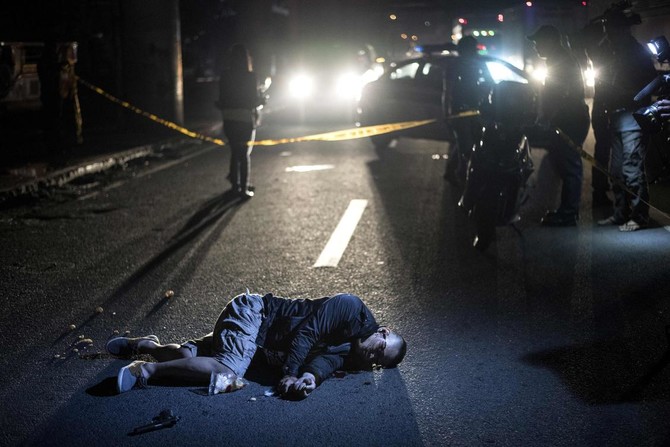MANILA: The head of the Philippines’ powerful Catholic Church called Sunday for an end to the “waste of human lives” following a brutal week in President Rodrigo Duterte’s drug war in which a 17-year-old boy was among dozens killed.
Police raids dubbed “One Time Big Time” saw at least 76 people shot dead, authorities said, as rights groups and lawmakers condemned the operation as an alarming “killing spree” in Duterte’s flagship campaign.
On Sunday, the highest-ranking Church official in the predominantly Catholic nation expressed concern about the increase in the number of deaths.
“We knock on the consciences of those who kill even the helpless, especially those who cover their faces with bonnets, to stop wasting human lives,” Manila Cardinal Luis Tagle said in a statement read in Sunday Masses in the capital.
“The illegal drug problem should not be reduced to a political or criminal issue. It is a humanitarian concern that affects all of us.”
Duterte, 72, launched an unprecedented crackdown on illegal narcotics after winning the presidency last year on a promise to kill tens of thousands of criminals.
The Church, one of the nation’s oldest and most influential institutions, had been among the few voices denouncing the deaths as polls showed Duterte continued to enjoy widespread popularity.
During the 14 months Duterte has been in power, police have confirmed killing more than 3,500 people — insisting they acted in self-defense.
More than 2,000 other people have been killed in drug-related crimes and thousands more murdered in unexplained circumstances, according to police data.
The numbers saw a sudden increase this week, with Duterte praising officers who shot dead 32 people in a single province as he urged for more.
Following Duterte’s call, at least 44 people were killed in various cities, including a 17-year-old boy whose death on Thursday sparked a national furor.
Relatives of Kian Delos Santos released CCTV footage of the boy being dragged away by two officers as they questioned a police report that he shot at them first.
In Sunday’s statement, Tagle called for nine days of prayer for people who have died in the drug war.
“Those with sorrowful hearts and awakened consciences may come to your pastors to tell your stories and we will document them for the wider society,” he said.
The Catholic Church has been a central figure in some of the Philippines’ most tumultuous political events, including the 1986 “People Power” revolution that overthrew dictator Ferdinand Marcos.
The Church had initially declined to criticize Duterte’s drug war but as the death toll of mostly poor people mounted, it began last year a campaign to stop the killings.
Church groups have sheltered witnesses and provided financial and emotional support for families of those slain.
In response, Duterte had launched a broadside against priests and bishops whom he accused of “hypocrisy.”
On Sunday, the president of the Catholic Bishops’ Conference of the Philippines joined Tagle in denouncing the deaths, calling on the faithful to ring church bells daily in solidarity with the victims.
“The sound of the bells is a wake-up call for a nation that no longer knows how to condole with the bereaved, that is cowardly to call out evil. The sound of the bells is a call to stop consenting to the killings!” Archbishop Socrates Villegas said in a statement.
Duterte’s spokesman said Saturday the government would investigate the deaths but added the president would “vigorously pursue” his drug war.
Philippine Church head urges end to drug killings
Philippine Church head urges end to drug killings

French court slashes jails term for trio over 2020 teacher beheading

- Brahim Chnina, the Moroccan father of a girl who falsely claimed that Paty had asked Muslim students to leave his classroom before showing the caricatures, had his 13-year sentence reduced to 10 years
PARIS, France: A French court on Monday reduced on appeal the jail sentences of three men convicted over the 2020 terrorist beheading of a teacher who showed a class cartoons of the Prophet Muhammad.
Samuel Paty, 47, was murdered in October 2020 by an 18-year-old radical Islamist of Chechen origin in an act that horrified France.
His attacker, Abdoullakh Anzorov, was killed in a shootout with police.
Two friends of Anzorov, French national Naim Boudaoud and Azim Epsirkhanov, a Russian of Chechen origin, had their sentences of 16 years in prison reduced to six and seven years respectively by a Paris court of appeal.
Both were accused of having driven Anzorov and helping him to procure weapons before the beheading.
Brahim Chnina, the Moroccan father of a girl who falsely claimed that Paty had asked Muslim students to leave his classroom before showing the caricatures, had his 13-year sentence reduced to 10 years.
His daughter, then aged 13, was not actually in the classroom at the time and during the first trial apologized to the teacher’s family.
The court however left the 15-year term for French-Moroccan Islamist activist Abdelhakim Sefrioui untouched.
The quartet were among the seven men and one woman found guilty in 2024 of contributing to the climate of hatred that led to the beheading of the history and geography teacher in Conflans-Sainte-Honorine, west of Paris.
Paty, who has become a free-speech icon, used the cartoons as part of an ethics class to discuss freedom of expression laws in France.










